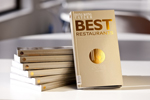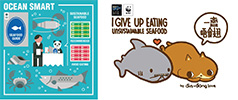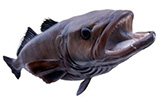New Sustainable Seafood Items are around the corner
We often receive news about new sustainable seafood items becoming available in Hong Kong. Watch this space for the latest updates! Read the full article here.
- Available now! ASC-certified Basa
- Next change! MSC-certified Toothfish
- Coming soon! Watch out for ASC-certified Shrimp
If you’d like to know the supplier’s contact for the above products or other sustainable seafood products in general, email us!
For those who are new to MSC (Marine Stewardship Council) and ASC (Aquaculture Stewardship Council), these are the two global certification systems for wild caught and farming seafood respectively. If you are interested, more information could be found from the following links:
|
|
|
First Regional Sustainable Seafood Festival
Support for sustainable seafood is picking up steam in the region. To celebrate World Oceans Day, by working closely with MSC and ASC, WWF offices in Asia gathered forces and launched the first ever regional Sustainable Seafood Festival this June. The participating countries include Singapore, Malaysia, Japan, Indonesia and China. To raise awareness about the challenges our oceans face and need for support for sustainable seafood, the WWF offices collaborated with restaurants and hotels to bring exciting sustainable seafood dishes to the customers. They also organized other fun-filled activities to spread the message of sustainable seafood amongst the public. Click on the countries above to check out what’s happening in each country! For those restaurants who worked with us in the last Sustainable Seafood Week at SOHO in HK, a big thank you as you helped confirm that this promotional event did work very well!

|
|
|
All round support for sustainable seafood!
The sustainable seafood movement has been gaining traction in Hong Kong. Different sectors have adopted their own ways to support sustainable seafood. Read more about them here. There are many ways for your company to support sustainable seafood. We are happy to explore the opportunities with you – contact us!
 © Café Deco
© Café Deco
|
|
|
Shark Fin Consumption Survey – we need you!
WWF-Hong Kong is conducting a survey within the catering industry to study local shark fin consumption patterns and to better understand the industry’s attitudes and opinion towards the local shark fin movement and its supply and demand. This information is critical as it allows it to keep track of the changes in shark fin consumption trends over time.
During the analysis, all individual data collected from the survey will be kept strictly confidential. Some major catering chains have already helped us complete the questionnaire.
If you are being approached to fill up the survey, please help as we need your valuable input to make it a baseline study for many years to come. If you would like to take part in this meaningful survey, please contact our survey coordinator Miss Michelle Luk at mluk@wwf.org.hk.
|
|
|
Shark fin product imports record a drop of over 30 per cent
According to The Census and Statistics Department, the volume of shark fin products imported into Hong Kong in 2013 dropped by 34.7 per cent. A 17.5 per cent decrease was also recorded in re-export volumes.
Read more here
We shall not be over joyful from these figures as there may have lesser shark in the ocean. Besides, the existing Hong Kong Harmonized System (HKHS) codes failed to identify specific shark species, making it difficult to monitor trends in the trade. WWF-Hong Kong has submitted proposal to the Hong Kong government to improve the existing HKHS codes in order to better regulate the shark fin trade and improve its transparency. Read below for details.
 © Jürgen Freund / WWF-Canon
© Jürgen Freund / WWF-Canon
|
|
|
WWF recommendations to Hong Kong Government to improve seafood trade monitoring system
Hong Kong accounts for 50% of the global shark fin trade and we are also one of the most important consumption and trade hubs of reef food fish such as groupers. There is growing threat to the survival of both groups of species partly due to the huge demand for them from the Hong Kong and China market. WWF-Hong Kong is working closely with other local environmental NGOs to propose improvement on the existing Hong Kong Harmonized System (HKHS) codes. The HKHS codes is the system to record the import, export and re-export of a range of items into and out of Hong Kong for these highly globally traded species. Read more here.
 © Jürgen Freund / WWF-Canon
© Jürgen Freund / WWF-Canon
|
|
|
Hong Kong Tatler Best Restaurants Guide promotes sustainable seafood
The Hong Kong Tatler Best Restaurant Guide showed their strong appetite for sustainable seafood in their latest guide. In fact, it is their policy not to recommend dishes that include endangered species or other environmentally unsustainable animal products, such as Bluefin tuna, Chilean seabass, wild sturgeon caviar and shark’s fin. Indeed, as highlighted in the Guide, “ consumers should take responsibility for what they eat” and they also call on consumers to “ think carefully before taking momentary pleasure in food that causes vast and permanent damage to the environment”.
Read more here.

|
|
|
Beyond switching off lights – choose sustainable seafood!
Earth Hour 2014 was successfully held on 29 March with over 3,900 companies and buildings, all universities and more than 320 primary and secondary schools across Hong Kong gave their support to the world’s largest environmental action.
To continue the spirit of Earth Hour beyond just turning off the lights for an hour, WWF-Hong Kong launched an One Earth Mission which urged everyone to create a sustainable future by making changes to the way we consume food and clothing, and how we approach travelling and our general lifestyle. As part of the challenge, the public was asked to reduce food waste and consumption of unsustainable seafood by ordering only what they can eat and by avoiding eating shark fin, shrimp and golden threadfin bream. The activities were mainly promoted through Facebook and the event website. The materials posted for this particular challenge received 5,146 likes and was shared 858 times in just one week!
Read more here.

|
|
|
Hong Kong to introduce legislation to regulate toothfish trade
Echoing to our ask since 2010, WWF-Hong Kong welcomes the Hong Kong government’s initiative to extend the Convention on the Conservation of Antarctic Marine Living Resources (CCAMLR) to Hong Kong by regulating the import and re-export of toothfish (commonly known as ‘Chilean Sea Bass’) inhabiting the Antarctic water. This move can help close the regulatory loophole of the toothfish import and re-export in Hong Kong, and legislate against the trade in Illegal, Unregulated and Unreported (IUU) toothfish products into Hong Kong. Read more here.
 Photo source: theage.com.au
Photo source: theage.com.au
|
|
|
|
|